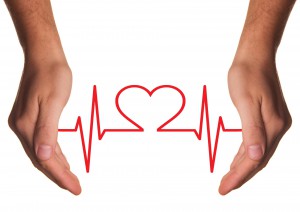
Did you know that heart disease is the #1 killer of Americans, accounting for 1 in every 4 deaths? It has been called the “silent killer” because often there are no symptoms.
Your risk for heart disease can depend on many things. The good news is that 80% of risk factors are preventable!
Things you can do to reduce your risk:
- Avoid use of and exposure to tobacco.
- Avoid excessive alcohol consumption.
- Be physically active every day.
- 150 minutes per week of aerobic activity, equivalent to brisk walking, has been shown to lower obesity, blood pressure, triglycerides, and LDL (bad) cholesterol, and increase HDL (good) cholesterol
- Aim for a healthy body weight.
- Keep your Body Mass Index (BMI) below 25. Calculate your BMI
- Aim for normal blood glucose. Diabetes is the 7th leading cause of death in the US and can cause serious health complications such as heart disease, blindness, kidney failure, and amputations.
- Fasting glucose levels over 100mg/dL could signify prediabetes
- Fasting glucose levels over 126mg/dL could signify diabetes
- Check your blood pressure regularly.
- Less than 120/80 mmHg is normal
- 120-139/80-89 mmHg is pre-hypertension
- 140/90 mmHg or higher is hypertension
- Check your cholesterol. People with high cholesterol have about twice the risk of heart disease as people with lower levels. Aim for:
- Total Cholesterol (less than 200 mg/dL)
- Low triglycerides (less than 150 mg/dL)
- Low LDL (bad) cholesterol levels (less than 100 mg/dL)
- High HDL (good) levels (60 mg/dL or higher)
- Consume a healthy diet. According to the Dietary Guidelines for Americans and ChooseMyPlate, a healthy eating plan:
- Emphasizes fruits, vegetables, whole grains, and fat-free or low-fat milk and milk products
- Includes lean meats, poultry, fish, beans, eggs, and nuts
- Is low in saturated fats, trans fats, cholesterol, salt (sodium), and added sugars
- Stays within your daily calorie needs
Taking care of yourself is no easy job! Talk to your doctor and schedule regular checkups. Knowing what your risk for heart disease is literally can save your life. For more information about reducing your risk of heart disease, visit the Centers for Disease Control and Prevention.
 0
0
